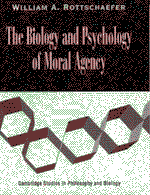Book contents
- Frontmatter
- Contents
- Preface
- Introduction
- PART I MORAL AGENCY AND SCIENTIFIC NATURALISM
- PART II THE BIOLOGICAL BASES OF MORAL AGENCY
- PART III THE PSYCHOLOGICAL BASES OF MORAL AGENCY
- PART IV A SCIENTIFIC NATURALISTIC ACCOUNT OF MORAL AGENCY
- PART V INTEGRATING A PERSONALISTIC AND NATURALISTIC VIEW OF MORAL AGENCY
- References
- Index
Preface
Published online by Cambridge University Press: 19 September 2009
- Frontmatter
- Contents
- Preface
- Introduction
- PART I MORAL AGENCY AND SCIENTIFIC NATURALISM
- PART II THE BIOLOGICAL BASES OF MORAL AGENCY
- PART III THE PSYCHOLOGICAL BASES OF MORAL AGENCY
- PART IV A SCIENTIFIC NATURALISTIC ACCOUNT OF MORAL AGENCY
- PART V INTEGRATING A PERSONALISTIC AND NATURALISTIC VIEW OF MORAL AGENCY
- References
- Index
Summary
In this book I propose a scientific naturalistic account of moral agency, offering answers to four central questions: (1) what counts as moral agency, both substantively and functionally? (2) how do we acquire our capacities as moral agents? (3) how do we put these capacities to work? and (4) what makes for justified true moral beliefs, proper moral motivations, and successful moral action? I argue that moral agency is a phenomenon of the natural world best understood with the help of sciences. Making use of recent theories and findings in evolutionary theory, developmental biology and psychology, and social cognitive theory in psychology, I set forth a model of moral agency as a complex four-level capacity consisting of (1) a base level of both evolutionarily based and operantly learned capacities; (2) a behavioral level consisting of cognitively acquired moral beliefs and desires that is the immediate source for moral behaviors; (3) a reflective level composed of moral beliefs and desires concerning the behavioral-level moral beliefs and desires and regulative of the latter; and (4) a self-referentially reflective level by means of which an agent conceives of herself as a moral agent.
In proposing my model, I pursue a goal common to many philosophers, the search for what Wilfrid Sellars (1963) aptly called the synoptic vision: the attempt to see things as a whole.
- Type
- Chapter
- Information
- The Biology and Psychology of Moral Agency , pp. ix - xiiPublisher: Cambridge University PressPrint publication year: 1997



